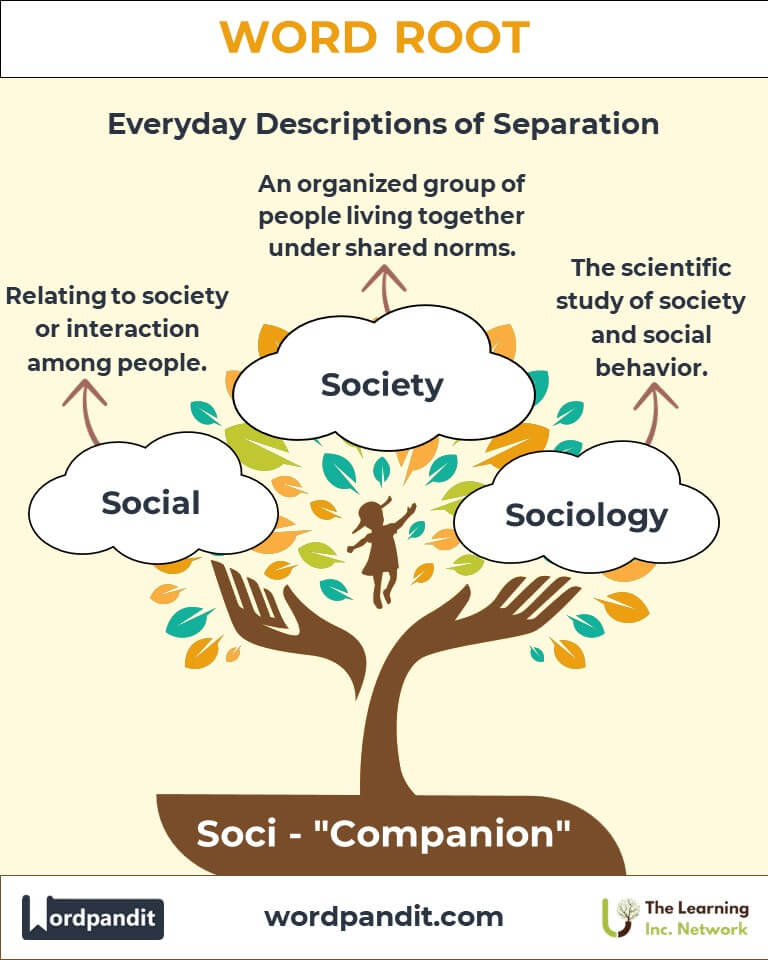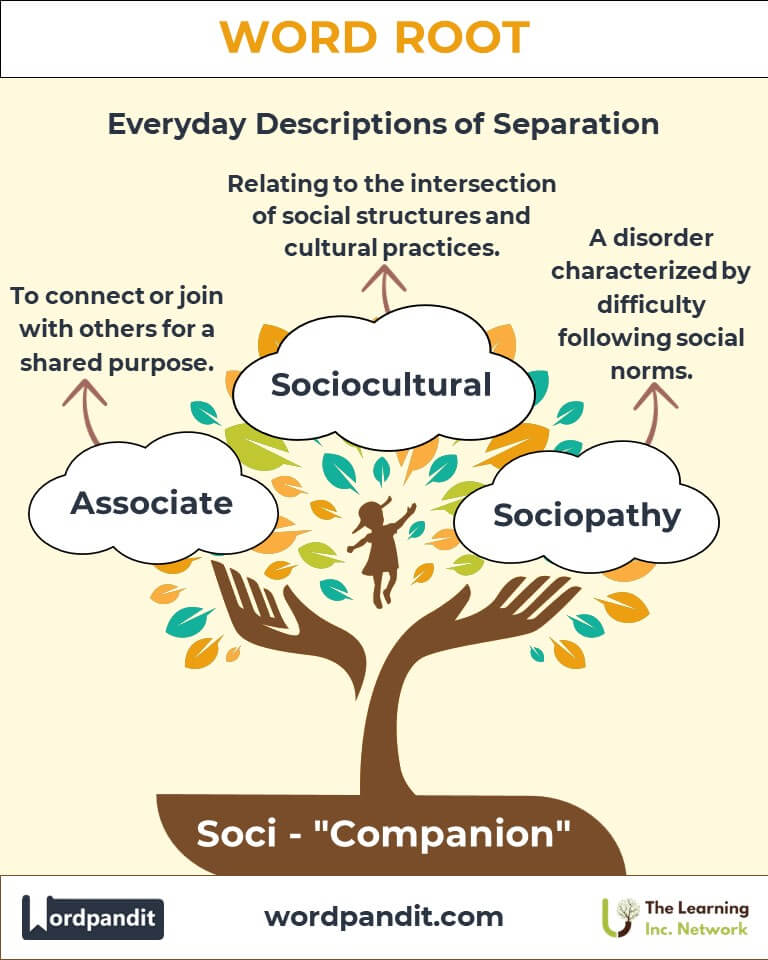Soci: The Root of Companionship in Language and Society
Explore the vibrant and interconnected world of the root "soci," derived from the Latin word socius, meaning "companion." From words like "social" to "society," this root has been integral in framing the essence of community, interaction, and collective living. Discover its historical journey, applications, and relevance across disciplines.

Table of Contents
- Introduction: The Essence of Soci
- Etymology and Historical Journey
- Mnemonic: Unlocking the Power of Soci
- Common Soci-Related Terms
- Soci Through Time
- Soci in Specialized Fields
- Illustrative Story: Soci in Action
- Cultural Significance of Soci
- The Soci Family Tree
- FAQs About the Soci Word Root
- Test Your Knowledge: Soci Word Root Quiz
- Conclusion: The Living Legacy of " Soci "
Introduction: The Essence of Soci
Have you ever wondered what connects people into communities or forms the basis of interactions? The root soci, pronounced soh-see, encapsulates this idea of companionship and collective existence. Derived from the Latin word socius meaning "companion," this root lies at the heart of words describing human interaction and organization. It manifests in terms like social, society, and sociology, underscoring its relevance in our interconnected world.

Etymology and Historical Journey
The root soci originates from the Latin word socius, meaning "companion" or "ally." Its related term societas (society) referred to a group of people bound by shared interests or obligations. The root migrated into Old French and Middle English, where it retained its communal essence. Over centuries, soci evolved to describe not only companionship but also structured systems of interaction, like societal norms and relationships.
Mnemonic: Unlocking the Power of Soci
Picture a vibrant marketplace buzzing with activity—a perfect symbol of companionship and community.
Mnemonic Device:
"SOCI stands for Sharing, Organizing, Connecting Individuals."
Common Soci-Related Terms
- Social (soh-shul): Relating to society or interaction among people.
Example: "Humans are inherently social creatures, thriving in groups." - Society (suh-sy-uh-tee): An organized group of people living together under shared norms.
Example: "The society embraced new policies to promote inclusivity." - Sociology (soh-see-ol-uh-jee): The scientific study of society and social behavior.
Example: "Sociology examines how culture influences interactions." - Associate (uh-soh-see-ayt): To connect or join with others for a shared purpose.
Example: "He chose to associate with groups that shared his values." - Sociable (soh-shuh-buhl): Friendly and willing to engage with others.
Example: "Her sociable nature made her popular at gatherings."
Soci Through Time
- Ancient Rome: Societas described alliances or partnerships for mutual benefit.
- Middle Ages: The term expanded to include broader communities, such as guilds or city-states.
- Modern Usage: Words like sociology emerged in the 19th century to study societal dynamics systematically.
Soci in Specialized Fields
- Anthropology: Sociocultural refers to the intersection of social structures and cultural practices.
Example: "Sociocultural anthropology studies rituals in various societies." - Business: Associate is widely used to describe partnerships or team members.
Example: "The associate managed key client accounts." - Technology: Social media highlights digital platforms that facilitate human interaction.
Example: "Social media revolutionized global communication." - Psychology: Sociopathy describes a disorder where individuals struggle with social norms.
Example: "The study focused on the traits of sociopathy."
Illustrative Story: Soci in Action
Lila, a sociable young woman, moved to a bustling city. Feeling isolated at first, she joined a community theater group. Over time, she developed meaningful associations and learned about the diverse societies represented in the group. Through the power of companionship, Lila found her place and thrived, demonstrating the profound impact of the root soci in action.
Cultural Significance of Soci
The concept of companionship and community is central to many cultures. From traditional village councils to modern online societies, the root soci reflects the human need for connection. Proverbial wisdom, such as "No man is an island," underscores the universal truth that individuals thrive through association and collaboration.

The Soci Family Tree
- Comm (Latin: "together"):
Example: Community: A unified group sharing common interests. - Anthrop (Greek: "human"):
Example: Anthropology: The study of humans and their societies. - Civ (Latin: "citizen"):
Example: Civilization: A complex society with cultural and technological development.

10. FAQs About " Soci "
Q: What does the root "soci" mean?
A: The root "soci" comes from the Latin "socius," meaning "companion" or "ally." It serves as the foundation for words that describe community, interaction, and relationships among people, such as social and society.
Q: What is sociology, and how does it differ from anthropology?
A: Sociology is the scientific study of society, social behaviors, and group dynamics. Anthropology, on the other hand, is the broader study of humans, including cultural, physical, and biological aspects. While sociology focuses on modern societal structures, anthropology delves into human evolution, ancient cultures, and traditions.
Q: What is the difference between "sociable" and "social"?
A:
- Sociable: Describes a person’s disposition to be friendly, outgoing, and willing to interact with others.
- Social: Refers to activities, structures, or phenomena related to groups or communities, such as social media or social norms.
Q: What does it mean to "associate" with someone or something?
A: To associate means to connect with or join someone or something, often for a shared purpose. For instance, professionals might associate to form a collaborative team, or you may associate specific memories with a particular place.
Q: What is the role of the root "soci" in social media?
A: The term social media directly reflects the root "soci." It highlights platforms designed to connect people and foster interaction. These digital tools serve as modern manifestations of the root’s original essence of companionship and collective activity.
Q: What is a sociopath, and how is the term related to the root "soci"?
A: A sociopath is a person with a personality disorder characterized by a disregard for societal norms and the rights of others. The term "soci" here reflects its antithesis—while "soci" suggests connection and harmony, a sociopath disrupts and disregards these communal bonds.
11. Test Your Knowledge: " Soci " Mastery Quiz
1. What does the root "soci" mean?
2. Which word describes the study of societies?
3. What does "sociable" mean?
4. Which term refers to digital platforms for interaction?
5. What is the Latin origin of "soci"?
Conclusion: The Living Legacy of Soci
The root soci is a testament to the enduring importance of companionship and collective living. From shaping ancient alliances to influencing digital interactions, its relevance transcends time. As society continues to evolve, the root soci remains a cornerstone of language, embodying the spirit of human connection and collaboration. Let it inspire you to nurture relationships and embrace the power of community.














